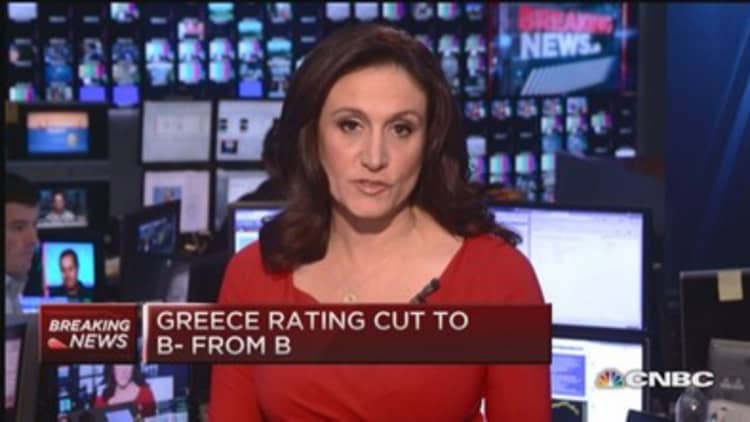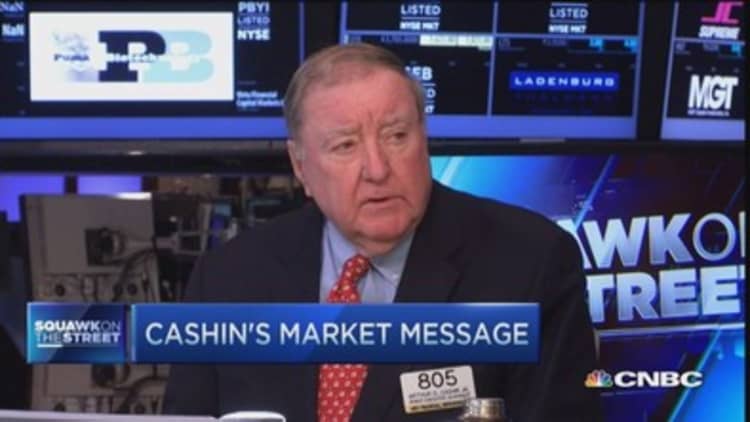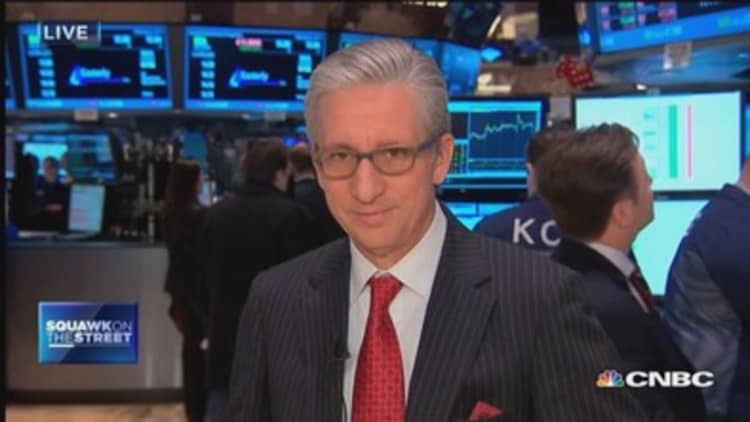


U.S. stocks closed down on Friday, ending the week significantly higher, amid continued concerns over Greece and a strong jobs report that renewed the possibility of an earlier Fed rate hike.
The Dow Jones Industrial Average closed up 3.84 percent for the week, its best week since January 2013 and posting gains of 1.22 points for the year. The index briefly dropped more than 100 points in the last hour of trading following the S&P's afternoon downgrade of its rating on Greece to "B-" from "B."
"That downgrade in Greece is basically causing a little profit-taking here," said Peter Cardillo, chief market economist at Rockwell Global Capital. "Markets have been up strongly all week."
Read MoreS&P downgrades Greece, says time is running out
The S&P 500 closed up for the week at 3.03 percent, its best week since Dec. 19.
"It's irrational selling," said Peter Boockvar, chief market analyst at The Lindsey Group, noting that Moody's already had a lower "Caa1" credit rating on Greece.
Earlier, stocks traded moderately higher as cheer over a strong jobs report was slightly offset by increased potential for an earlier Fed interest rate hike.
"This is a solid report," Cardillo said. "This certainly shows the job market continues to grow. Revisions (for previous months) revised up. I think it will all be market friendly."
Financials, a likely beneficiary of higher interest rates, initially rose by as much as more than 1.5 percent as a leading sector in the S&P 500, which declined on Greek news but still held near the key 2,060 level.
Top blue chip performers JPMorgan Chase initially traded by as much as more than 3 percent higher, and Goldman Sachs also traded nearly 2 percent higher.
"The stock market wants it every which way," Boockvar said. "The bottom line is the data continues to pressure the Fed into raising rates."
On the flip side, utilities traded lower, closing down 4.13 percent as the weakest sector in the S&P 500.
"We know we have a very cautious and patient Fed," said Art Hogan, chief market strategist at Wunderlich Securities. "What we have to focus on is a stronger U.S. economy."
Atlanta Fed President Dennis Lockhart on Friday said he thinks the U.S. economy continues to grow strongly enough to justify an initial interest rate hike later this year, but that weak inflation and wage growth were "worrisome."
The Labor Department said the United States created 257,000 jobs in January, beating estimates of about 230,000. More importantly, average hourly earnings grew by 0.5 percent, above estimates.
Read MoreExperts: Yes, US jobs report is good, but ...
The unemployment rate rose to 5.7 percent, slightly above estimates.
"The unemployment rate went up for the right reason—participation rate going up," Hogan said.
Futures turned higher on the news with Dow futures extending gains from 9 points to as much as more than 80 points. The U.S. 10-year Treasury note yield rose from about 1.80 percent to as high as 1.91 percent before the open.
US 10-year Treasury note yield
"The Fed's game of rationalizing zero interest rates has no touch with reality," Boockvar said in a note. "The reason, however, why this good job growth is not translating into faster GDP growth is because productivity is so poor, which means that 2015 could be the peak in corporate profit margins."
Thursday's reports showed non-farm productivity fell a greater-than-expected 1.8 percent for the fourth quarter. Economists had forecast productivity, which measures hourly output per worker, rising at a 0.5 percent pace.
Read MoreChart: What's the real unemployment rate?
Social media stocks Twitter and LinkedIn surged more than 10 percent on Friday, following strong earnings reports. Yelp fell more than 20 percent on weak guidance.
Friday is a much quieter day for earnings, with Moody's and Madison Square Garden posting earnings that beat. CBOE Holdings missed expectations. Energy company Dominion is due to report after the bell.
European stocks closed higher on the U.S. jobs report. Earlier, European equities traded lower after Greece's talks with Germany—the euro zone's largest economy—over the future of its bailout program had mixed success.
On Thursday, Greek Finance Minister Yanis Varoufakis met his German counterpart Wolfgang Schaeuble in Berlin after a week of touring European capitals in an effort to drum up support for Greece's new proposals over its debt and bailout program.
Following the talks, Schaeuble said the ministers had "agreed to disagree."
The Greek government is under pressure to find a solution to its funding situation as international lenders are unwilling to release its latest tranche of aid until it makes a commitment to continue with the conditions of its bailout.
Read MoreFriday's midday movers: Intuit, Petrobras & more
The Dow Jones Industrial Average closed down 60.50 points, or 0.34 percent, at 17,824, with Verizon leading and Intel the greatest blue chip laggard.
The S&P 500 closed down 7.05 points, or 0.34 percent, at 2,055, with utilities leading eight decliners and telecoms and financials leading advancers.
The Nasdaq closed down 20.70 points, or about 0.43 percent, at 4,744.
Major U.S. Indexes
The CBOE Volatility Index (VIX), widely considered the best gauge of fear in the market, edged higher to trade near 18.
Two stocks declined for every advancer on the New York Stock Exchange, with an exchange volume of 927 million and a composite volume of 4.2 billion in the close.
High-frequency trading accounted for 47.5 percent of February to date's daily trading volume of about 7.7 billion shares, according to TABB Group. During the peak levels of high-frequency trading in 2009, about 61 percent of 9.8 billion of average daily shares traded were executed by high-frequency traders.
The U.S. 10-year Treasury note yield traded near 1.96 percent. The U.S. dollar reversed to edge lower against major world currencies.
In oil markets, crude oil prices rose on Friday, continuing a rebound from near-six-year lows seen last week, with Brent crude futures settled up $1.23 at $57.80 a barrel, and U.S. crude for March delivery settled up $1.21, at $51.69 a barrel. The S&P 500 has been highly correlated to oil since the commodity began plummeting last June.
Gold futures settled down $28.10, or 2.28 percent, at $1,234.60 an ounce.
—CNBC's Fred Imbert and Reuters contributed to this report.
More From CNBC.com:


